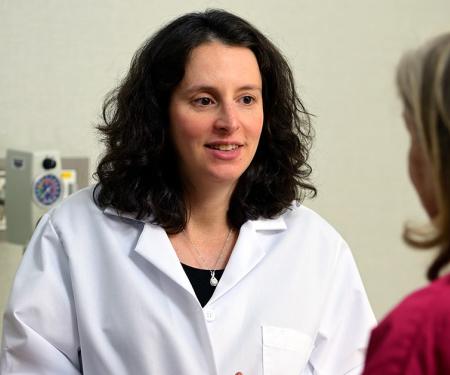Fewer than 1,500 people in the United States are diagnosed with cancer of the appendix each year. Because this disease is typically asymptomatic until later stages, it is difficult to diagnose until after it has significantly progressed. Often, appendiceal cancer is found when a patient has surgery for appendicitis or during imaging for an unrelated condition.
How is Appendix Cancer Diagnosed?
Through the following techniques, doctors may identify appendix cancer and whether it has spread:
Imaging
Imaging tests look for visible tumors in or around the appendix. These types of tests include:
- CT and MRI scans: Computed tomography (CT) and magnetic resonance imaging (MRI) scans create images of your body in different dimensions, distinguishing abnormalities within normal organs and showing the difference between normal and potentially cancerous tissues.
- PET scans: Positron emission tomography (PET) scans show how organs and tissues are functioning. Because of this, PET scans are often used to detect cancer. The patient receives a small dose of a radioactive drug (radiotracer) that makes cancerous cells “light up” on the scan.
- Ultrasounds: During ultrasounds (US), high-frequency sound waves create pictures of internal organs and can detect abnormalities (including tumors).
Image-Guided Biopsies
During a biopsy, a piece of tissue is removed to be examined for abnormal or cancerous cells. US, CT scans, and MRI scans can be used to guide biopsies.
How is Appendix Cancer Staged?
The stage of a patient’s appendix cancer is determined by several factors:
- The cancer’s size and location
- If the cancer has spread to the lymph nodes, and if so, how many
- If the cancer has spread to other parts of the body
Stages of Appendix Cancer
- Stage 0: In this stage, the cancer is found in only one location and has not spread. This stage is also known as appendix cancer in situ.
- Stage I: At this stage, the cancer has spread to the inner layers of appendix tissue, but not to the regional lymph nodes or other parts of the body.
- Stage II: At stage II, the cancer has grown into the connective or fatty tissue next to the appendix, through the lining of the appendix, or into other organs (such as the colon or rectum). However, it has not spread to the regional lymph nodes or to other parts of the body.
- Stage III: In this stage, the cancer has spread to the inner layers of the appendix tissue or grown into nearby tissues (as well as spread to one, two, or three regional lymph nodes) or it has spread to four or more regional lymph nodes. It has not spread to other parts of the body.
- Stage IV: The most advanced stage of appendix cancer involves the cancer spreading to other areas in the abdomen or outside the abdominal area to distant parts of the body, such as the lungs. It may or may not have spread to regional lymph nodes.
How Soon Can I Expect Test Results?
It usually takes at least a few days to receive a test report, although the time varies for each patient. Your physician will provide your results as soon as possible, along with a thorough explanation of your diagnosis and answers to any questions you have. At that time, your physician will recommend potential procedures and a treatment plan tailored to your diagnosis.
What If I Have Already Been Diagnosed at Another Hospital?
If you have been diagnosed with cancer of the appendix, you will most likely want to start treatment as soon as possible. However, it can be a good idea to have another expert weigh in on your diagnosis and treatment options.
At Fox Chase, we routinely offer second opinions, which can help identify new treatment options that might be more effective for your condition. In fact, it is common for individuals to seek a second opinion for a cancer diagnosis, and some insurance companies even require it.
Second opinions are incredibly important for rare diseases like appendiceal cancer, which isn’t frequently seen in smaller medical settings and requires experienced pathologic evaluation.
Coming to Fox Chase also means you will likely have greater access to clinical trials appropriate for your condition. Our designation as a Comprehensive Cancer Center by the National Cancer Institute (NCI) means we are part of a network of research centers where hundreds of clinical trials take place every day. The results of studies conducted by Fox Chase doctors have been crucial in advancing our understanding of cancer diagnosis and treatment around the world.
If you decide to seek a second opinion at Fox Chase, bring your medical records, imaging results, and pathology report to your first appointment, or have your physician forward them to us.
Your Patient Care Team at Fox Chase
To design an individualized treatment plan for each patient, our appendix cancer team draws on the diverse experience of physicians and clinical staff specializing in surgical oncology, radiation oncology, hematology/oncology, and diagnostic imaging. We work together to diagnose your cancer and help you make informed decisions about your treatment.
Our dedicated team also includes nurse navigators, social workers, and other specialized support staff. As a key part of your team, they will provide emotional support and coping strategies for you and your family when you need them most.
